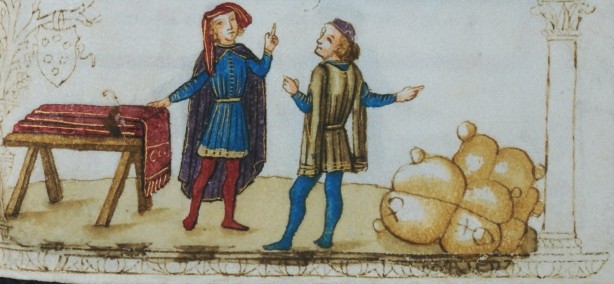From Real World Economic Review:
In the beginning, there was barter. Then, and forever after, there was money
That’s the myth every student of economics learns, that money grows
out of barter. The idea is that monetary exchange solves the problem of
the double coincidence of wants—that a person who is interested in
trading needs to find someone who wants what they have and has what they
want. Money makes trade much easier, so the story goes, and thus
becomes a remarkable example of both human ingenuity and
economic progress.
The fact is, as Ilana E. Strauss
[ht: ja] explains, the story is false. Human beings did not invent
money to solve the difficulties of barter exchange. Barter turns out to
be a historical myth.
various anthropologists have pointed out that this barter
economy has never been witnessed as researchers have traveled to
undeveloped parts of the globe. “No example of a barter economy, pure
and simple, has ever been described, let alone the emergence from it of
money,” wrote the Cambridge anthropology professor Caroline Humphrey in
a 1985 paper. “All available ethnography suggests that there never has been such a thing.”
When barter has appeared, it wasn’t as part of a purely
barter economy, and money didn’t emerge from it—rather, it emerged from
money. After Rome fell, for instance, Europeans used barter as a
substitute for the Roman currency people had gotten used to. “In most of
the cases we know about, [barter] takes place between people who are
familiar with the use of money, but for one reason or another, don’t
have a lot of it around,” explains David Graeber, an anthropology
professor at the London School of Economics.
A good example is the kind of exchange described by Fibonacci in his Liber Abbaci. He devoted the ninth chapter to “barter of merchandise and similar things.” But it wasn’t pre-monetary barter. Instead, as Randy K. Schwartz explains,
A barter was often recorded as such in a register or
account book, as if actual coins had been exchanged, when in fact no
coins at all were involved.
Because coins were still scarce, the widespread custom among
merchants was to set the barter price for a commodity by “marking up”
the cash price by a certain percentage. The two barterers had to agree
on the markup rate ahead of time, or else one would feel cheated.
In other words, this was exchange that took money as the unit of
account but, because coins were scarce, it took the form of the direct
exchange of goods—say, wool for cloth.
And there are many other examples in the historical and
anthropological record of forms of exchange that precluded
money—centralization and redistribution, gifts, potlatch, trade at the
edges of and between non-monetary societies, and so on. But there was no
original barter economy, which was then surpassed by the use of money.
That’s a myth that began with Adam Smith:...MORE
